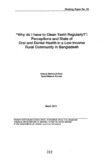"Why do I have to clean teeth regularly?": perceptions and state of oral and dental health in a low-income rural community in Bangladesh
Citation
Khan, A. M., & Ahmed, S. M. (2011, March). “Why do I have to clean teeth regularly?”: perceptions and state of oral and dental health in a low-income rural community in Bangladesh. Research Reports (2011): Health Studies, Vol - XLIII, 322–360.Abstract
The general perception that dentistry is expensive keeps many people away from
seeking treatment from registered professionals and make them hostage to the
services of non-registered lay practitioners. In Bangladesh, no statistics on dental
health problems or seeking dental healthcare is available which necessitates study for
informed planning of a preventive programme. BRAC Research and Evaluation
Division carried out a pilot survey in three unions of Gauripur upazila to document the
knowledge and awareness and existing oral hygiene practices among the rural
people and also, to explore the care-giving practices of the health care practitioners -
both professionals and non-professionals. Both quantitative and qualitative methods
were used for data collection. Also clinical examination was done to record their
current state of oral cavity. Findings reveal poor oral and dental health condition of
the survey population and their lack of knowledge and awareness conducive to good
oral and dental health. Findings also reveal their reliance on informal sector providers
for treatment of oral and dental health illnesses due to non-availability of qualified
professionals. Oral hygiene practice is a neglected chore in the daily routine of the
survey population as revealed through real life observation in the study area. The
community people hardly used tooth brush and/or tooth paste/powder. Instead, they
used various abrasive materials like charcoal powder, branches of trees claimed to
have medicinal properties, etc. for cleaning teeth which is damaging, and in turn,
cause different oral and dental health problems. The implication of these findings for
programme development is discussed.

